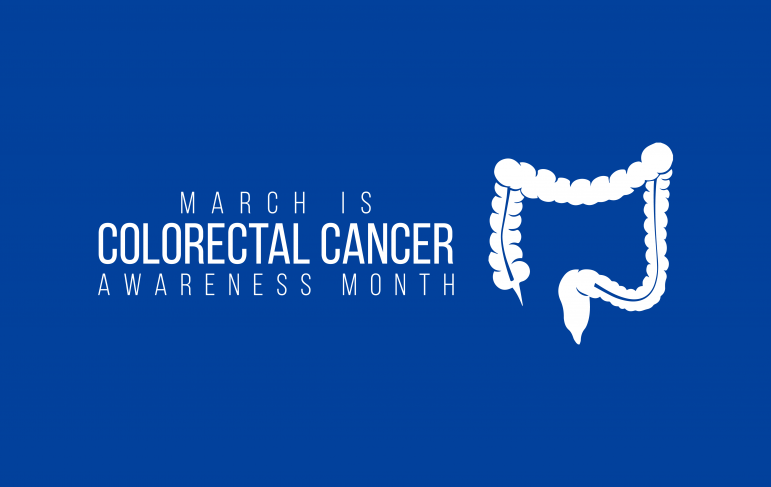Colorectal Cancer Awareness Month 2022
March is Colorectal Cancer Awareness Month. Colorectal cancer is cancer of the colon or rectum. It is the second most common cancer in men and women combined, and it is a highly treatable cancer when caught early. Around 1 in 24 people will be diagnosed with colorectal cancer in their lifetime. It is typically found in people 45 years or older, so people who turn 45 are recommended to get screened yearly. Younger people are also being diagnosed so watching out for symptoms is very important. Around 150,000 Americans are diagnosed with colorectal cancer every year and more than 50,000 Americans die from it each year. Most of the time colorectal cancer starts as an abnormal tissue growth called a polyp. Screening allows doctors to detect these abnormal growths and remove them before they become cancer.
Certain people have an increased risk of being diagnosed with colon cancer. People with inflammatory bowel diseases like Crohn’s disease or ulcerative colitis are at an increased risk. People with a personal or family history of the disease are also at a higher risk. Genetic syndromes including familial adenomatous polyposis and hereditary non-polyposis colorectal cancer can also increase risk. Certain ethnic groups including African Americans and Ashkenazi Jews are more likely to develop colorectal cancers, so they need to be screened more often than the general population.
Sometimes people who are diagnosed with colon cancer experience no symptoms, but others experience symptoms that can lead to them seeing a doctor. People can experience symptoms including: a change in bowel habits (diarrhea, constipation, narrowing of the stool) lasting for more than a few days, feeling the need for a bowel movement but not being relieved by having one, rectal bleeding, blood in the stool (stool looks dark brown or black), cramping or abdominal pain, weakness and fatigue, and unintended weight loss. Some people might even be diagnosed with colorectal cancer after having low blood cell counts because of blood seeping into the stool. Many of these symptoms can be from irritable bowel syndrome, hemorrhoids, or infections, but since colorectal cancer is serious, it is best to see a doctor to rule it out.
Treatment for colorectal cancer depends on the stage that it is caught. If polyps are found during a colonoscopy, they can easily be surgically removed by the doctor with a polypectomy. The best option for colon cancer treatment is surgical resection, where the cancer is removed surgically. The procedure is called an endoscopic mucosal resection. Special tools are used to remove larger polyps and a small part of the colon lining. If the surgeon cannot remove the cancer with endoscopic mucosal resection, laparoscopic surgery is performed. Small incisions are made in the abdominal wall and small instruments are used to remove the cancer. If the cancer is more advanced, the surgeon can perform a partial colectomy. The cancer is removed with a small amount of normal tissue surrounding the cancer and the bowel is reconstructed so normal bowel function is close to normal as it can be. If the cancer is removed and the cancer has not spread to the lymph nodes or other parts of the body, the patient does not need any more treatment. If the cancer spread, chemotherapy is usually recommended by doctors. After surgery, patients are monitored in three-to-six-month intervals for three years and six-to-12-month intervals after that. Colonoscopies are also done one year after surgery and every one to three years after that.
Chemotherapy can also be used at different stages of colon cancer including before surgery to shrink the tumor. It can also be given after surgery if the cancer has spread. Chemotherapy is also used to kill cancer cells that have spread throughout the body, reducing the risk of reoccurrence. Radiation therapy can be used as well where high levels of radiation from X-rays or protons are administered to kill cancer cells or relieve symptoms. Chemoradiation, where chemotherapy and radiation are used together, is also a possibility. They work together to be more effective against cancer cells. Targeted drug therapy can be useful as well. Drugs that target specific abnormalities in cancer cells are given, which helps kill cancer cells. Immunotherapy can also be used, where immune system boosting drugs help the immune system kill cancer cells.
People who worked with asbestos are at risk of developing colorectal cancer. Asbestos can be ingested leading to the sharp fibers becoming caught in the large intestine. The fibers do not break down, and over time, they irritate the area and cause DNA damage, leading to cancer in the area. If you have colorectal cancer and don’t know if you were exposed to asbestos, contact us to see if you could be entitled to compensation. We can help determine if you were exposed to asbestos and could be owed compensation from asbestos companies. Call 412-471-3980 or fill out our contact form and a member of our team will get back to you as soon as possible.




